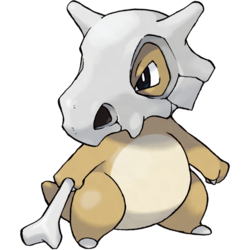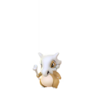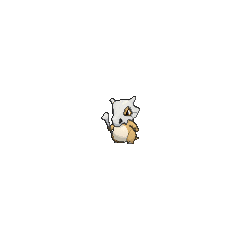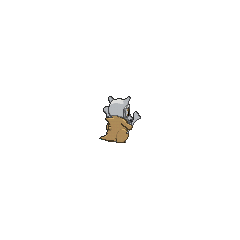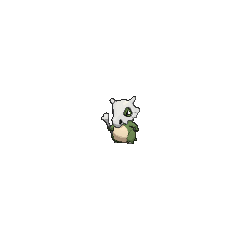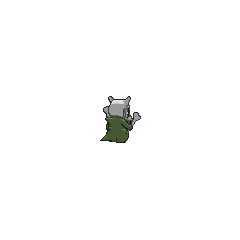|
|
| Line 517: |
Line 517: |
| * Cubone is one of the Pokémon that appears in the [[Pokémon 151]] clothing line. | | * Cubone is one of the Pokémon that appears in the [[Pokémon 151]] clothing line. |
| * Cubone is the only Pokémon that can [[Evolution|evolve]] into a dual-[[type]] Pokémon that doesn't share any types with its pre-evolution. | | * Cubone is the only Pokémon that can [[Evolution|evolve]] into a dual-[[type]] Pokémon that doesn't share any types with its pre-evolution. |
| * In Pokemon Sun and Moon, Cubone can call for help and a Kanghaskhan can appear. The relationship between these two species is unclear. | | * In Pokemon Sun and Moon, Cubone can call for help and a Kanghaskhan can appear. The relationship between these two species, if any, is unclear. |
|
| |
|
| ===Origin=== | | ===Origin=== |
Cubone (Japanese: カラカラ Karakara) is a Ground-type Pokémon.
It evolves into Marowak starting at level 28. In Alola, Cubone will evolve into Alolan Marowak when leveled up at night starting at level 28.
Biology
Cubone is a small, bipedal Pokémon with a golden brown hide that covers most of its body, including both dorsal spikes. Its belly is a very light brown. Two small claws, one on each hand, serve as its thumbs, and one large nail on each foot make up its toes. On its head, Cubone wears the skull of its dead mother as a helmet. Because of this, much of its actual face has never been seen, except for its triangular, black eyes and a small area surrounding them. The skull has two rounded horns on the top of its head and a tooth-like point on the lower sides. Under the skull, Cubone has a brown snout. The small Cubone survives only through the immense skill it possesses in wielding the bone it carries as a weapon. The bone allows it to learn Bone Club and Bonemerang, two moves exclusive to Cubone and its evolution Marowak.
It is called the Lonely Pokémon because of its tendency to keep to itself and avoid social situations, as it was apparently traumatized by the death of its mother. Cubone will often weep at night in mourning of its mother. When Cubone cries, the skull that it wears on its head vibrates and emits “a plaintive and mournful sound.” On the night of a full moon, the cries are said to be especially terrible. Cubone seems to recognize its mother in the moon, and so it howls with a particular sadness. It lives in rocky areas, usually on mountains or in caves. It also once inhabited the Pokémon Tower in Lavender Town where deceased Pokémon were buried and mourned.
In the anime
In the main series
Major appearances
Cubone first appeared in The School of Hard Knocks under the ownership of Giselle. She used Cubone against Ash's Pikachu, where it lost.
A Cubone was among the four Pokémon that were causing trouble for Pikachu and co. during Pikachu's Vacation.
A Cubone was helping Meowth prepare his party in Pichu Bros. in Party Panic. This Cubone played drums in Meowth's band and got easily sad and gloomy when Meowth chewed it out, but it was also easily consolable.
A Cubone appeaed in PK15. It was the leader of the haunted house where various Pokémon were living. It led them in attempts to scare visitors out of the house.
A Cubone appeared in Battling With a Clean Slate! under the ownership of Alva.
Minor appearances
A Cubone was seen in a Pokémon Center in Hypno's Naptime.
A Cubone also appeared in Pokémon Fashion Flash.
Cubone also appeared in A Chansey Operation as an injured Pokémon.
A Cubone appeared in Princess vs. Princess competing in the Queen of the Princess Festival contest.
A Cubone made an appearance in The Breeding Center Secret.
Multiple Cubone also appeared in The Power of One.
A Cubone belonging to the Nursing School, appeared in a flashback in Ignorance is Blissey.
A Cubone was one of the Pokémon living at Temacu's father's lab in The Heartbreak of Brock.
A Cubone was part of a Pokémon street festival in Doin' What Comes Natu-rally.
A Cubone appeared in Bulbasaur's flashback in Bulbasaur... the Ambassador!.
A Cubone was used by one of the students of the Pokémon Trainer's School in Gonna Rule The School!.
Cubone also appeared in the opening of Destiny Deoxys and Lucario and the Mystery of Mew.
A Cubone appeared in Showdown at Linoone.
A Cubone under the ownership of a Coordinator appeared in Dawn's Early Night!. It was used along with a Marowak for the Double Performance required during the Hearthome Contest.
A Cubone appeared in a flashback in Dealing With a Fierce Double Ditto Drama!.
A Cubone made a brief cameo appearance in Giratina and the Sky Warrior and Arceus and the Jewel of Life.
A Cubone appeared in A Jolting Switcheroo!.
Pokédex entries
| Episode
|
Pokémon
|
Source
|
Entry
|
| PK01
|
Cubone
|
Dexter
|
A Ground-type Pokémon, Cubone. Cubone has earned its classification as the Lonely Pokémon from its usual attitude of caring only for itself.
|
|
In Pokémon Origins
A Cubone appeared in File 2: Cubone in the Pokémon House in Lavender Town. It is the child of the ghostly Marowak, who died while defending it from Team Rocket.
In the manga
In the Pokémon Adventures manga
- Main article: Bonee
Cubone makes a cameo in Onix is On!, part of the Red, Green & Blue arc, battling against Red's Bulbasaur as a Pewter Gym Trainer's Pokémon.
Cubone appeared as a silhouette when Green explains about Mew in The Jynx Jinx.
Multiple Cubone were under the control of the Team Rocket Grunts in Piloswine Whine where they attack Gold and Silver but were easily defeated.
Crystal owns a Cubone named Bonee which it first appeared in Slugging It Out With Slugma, who has a star-shaped crack in his skull. Cubone's main role in the team is to take out targets from afar using his bone-based attacks. In Lively Larvitar, the origin of Crystal's Cubone is revealed: it, along with Crystal's Natu, Hitmonchan, and Parasect, were wild Pokémon living in Mt. Mortar and had fought with a local Arcanine that had gone berserk from a severe eye injury. Bonee had used several bone clubs for Crystal to use as arm casts.
In the Pokémon Pocket Monsters manga
A Cubone is seen with Green during the baseball match that took place in Fierce Competition at the Pokémon Baseball Tournament!.
Giovanni's Cubone was used in the Gym battle against Red in Get The Last Badge!!.
Red caught a Cubone prior to Red VS Green?!.
In the TCG
- Main article: Cubone (TCG)
Other appearances
In the Pokémon Stadium 2 stage, a Cubone can be seen on the Ground Terrain standing atop the highest platform built into a rock. Dugtrio and Pokémon Fossils can also be seen on the Ground Terrain.
Trophy information
"A Lonely Pokémon. It wears its mother's skull as a helmet--for this reason, no one has ever seen its face. It sometimes sees its departed mother's face in the full moon, which causes it to grow sad and cry. The stains on the skull are tracks of its tears. When it cries, the skull shakes and emits a mournful sound. When it levels up, it evolves into Marowak."
Merchandise
Cubone was one of the first four Pokémon designs revealed when the Pokémon 151 brand was first announced. In the shirt design, Cubone's skull is in the center of the shirt, with two Thick Clubs in crossing below it.
Game data
Pokédex entries
| Generation I
|
|
| Red(ENG)
|
Because it never removes its skull helmet, no one has ever seen this Pokémon's real face.
|
| Blue
|
| Yellow
|
Wears the skull of its deceased mother. Its cries echo inside the skull and come out as a sad melody.
|
| Stadium
|
Always wears the skull of its deceased mother on its head and never shows its face. It cries mournfully in the moonlight.
|
|
|
| Generation II
|
|
| Gold
|
If it is sad or lonely, the skull it wears shakes, and emits a plaintive and mournful sound.
|
| Silver
|
It always wears the skull of its dead mother, so no one has any idea what its hidden face looks like.
|
| Crystal
|
It lost its mother after its birth. It wears its mother's skull, never revealing its true face.
|
| Stadium 2
|
If it is sad or lonely, the skull it wears shakes, and emits a plaintive and mournful sound.
|
|
|
| Generation III
|
|
| Ruby
|
Cubone pines for the mother it will never see again. Seeing a likeness of its mother in the full moon, it cries. The stains on the skull the Pokémon wears are made by the tears it sheds.
|
| Sapphire
|
| Emerald
|
It pines for the mother it will never see again. Seeing a likeness of its mother in the full moon, it cries. The stains on the skull it wears are from its tears.
|
| FireRed
|
It wears the skull of its dead mother on its head. When it becomes lonesome, it is said to cry loudly.
|
| LeafGreen
|
Because it never removes its skull helmet, no one has ever seen this Pokémon's real face.
|
|
|
| Generation IV
|
|
| Diamond
|
When it thinks of its dead mother, it cries. Its crying makes the skull it wears rattle hollowly.
|
| Pearl
|
| Platinum
|
| HeartGold
|
If it is sad or lonely, the skull it wears shakes, and emits a plaintive and mournful sound.
|
| SoulSilver
|
It always wears the skull of its dead mother, so no one has any idea what its hidden face looks like.
|
|
|
| Generation V
|
|
| Black
|
When it thinks of its dead mother, it cries. Its crying makes the skull it wears rattle hollowly.
|
| White
|
| Black 2
|
When it thinks of its dead mother, it cries. Its crying makes the skull it wears rattle hollowly.
|
| White 2
|
|
|
| Generation VI
|
|
| X
|
It wears the skull of its dead mother on its head. When it becomes lonesome, it is said to cry loudly.
|
| Y
|
It always wears the skull of its dead mother, so no one has any idea what its hidden face looks like.
|
| Omega Ruby
|
Cubone pines for the mother it will never see again. Seeing a likeness of its mother in the full moon, it cries. The stains on the skull the Pokémon wears are made by the tears it sheds.
|
| Alpha Sapphire
|
|
|
| Generation VII
|
|
| Sun
|
When it thinks of its deceased mother, it weeps loudly. Mandibuzz that hear its cries will attack it from the air.
|
| Moon
|
The skull it wears on its head is that of its dead mother. According to some, it will evolve when it comes to terms with the pain of her death.
|
|
|
Game locations
In side games
|
|
| Generation II
|
|
| This Pokémon is unavailable in Generation II side games.
|
|
|
|
|
|
|
|
|
|
|
In events
Held items
Stats
Base stats
| Stat
|
Range
|
| At Lv. 50
|
At Lv. 100
|
50
|
|
110 - 157
|
210 - 304
|
50
|
|
49 - 112
|
94 - 218
|
95
|
|
90 - 161
|
175 - 317
|
40
|
|
40 - 101
|
76 - 196
|
50
|
|
49 - 112
|
94 - 218
|
35
|
|
36 - 95
|
67 - 185
|
Total: 320
|
Other Pokémon with this total
|
- Minimum stats are calculated with 0 EVs, IVs of 0, and (if applicable) a hindering nature.
- Maximum stats are calculated with 252 EVs, IVs of 31, and (if applicable) a helpful nature.
- This Pokémon's Special base stat in Generation I was 40.
|
Pokéathlon stats
Type effectiveness
| Under normal battle conditions in Generation IX, this Pokémon is:
|
|
|
|
|
|
|
|
|
|
|
|
|
Learnset
|
|
|
|
- Bold indicates a move that gets STAB when used by Cubone
- Italic indicates a move that gets STAB only when used by an Evolution of Cubone
- Click on the generation numbers at the top to see level-up moves from other generations
|
|
|
|
|
- Bold indicates a move that gets STAB when used by Cubone
- Italic indicates a move that gets STAB only when used by an Evolution of Cubone
- Click on the generation numbers at the top to see TM moves from other generations
|
|
|
|
|
- Moves marked with an asterisk (*) must be chain bred onto Cubone in Generation VII
- Moves marked with a double dagger (‡) can only be bred from a Pokémon who learned the move in an earlier generation.
- Moves marked with a superscript game abbreviation can only be bred onto Cubone in that game.
- Bold indicates a move that gets STAB when used by Cubone
- Italic indicates a move that gets STAB only when used by an Evolution of Cubone
- Click on the generation numbers at the top to see Egg moves from other generations
|
|
|
|
|
- A black or white abbreviation in a colored box indicates that Cubone can be tutored the move in that game
- A colored abbreviation in a white box indicates that Cubone cannot be tutored the move in that game
- Bold indicates a move that gets STAB when used by Cubone
- Italic indicates a move that gets STAB only when used by an Evolution of Cubone
- Click on the generation numbers at the top to see Move Tutor moves from other generations
|
TCG-only moves
Side game data
Evolution
Sprites
Trivia
- In the Pokémon Red and Blue beta, Cubone was originally known as "Orphon," a corruption of the word "orphan," based on its abandonment at birth.
- Cubone is Midori Harada's favorite Pokémon.
- Cubone is one of the Pokémon that appears in the Pokémon 151 clothing line.
- Cubone is the only Pokémon that can evolve into a dual-type Pokémon that doesn't share any types with its pre-evolution.
- In Pokemon Sun and Moon, Cubone can call for help and a Kanghaskhan can appear. The relationship between these two species, if any, is unclear.
Origin
Cubone may be based on a dinosaur. It also could be based on primitive cultures that wore bones for decoration and used them for weapons.
Name origin
Cubone may be a combination of cute and bone, cub and bone, or cue ball (a reference to its pale white head or that its bone resembles a billiards or snooker cue) and bone. It could also be a combination of the Latin word cubo (recluse) and bone; this can refer to its lonely nature.
Karakara may be taken to mean からから (clattering). It is worth noting that karakara denotes lighter clattering than がらがら garagara.
In other languages
| Language
|
Title
|
Meaning
|
 Japanese Japanese
|
カラカラ Karakara
|
Onomatopoeia meaning "a light clattering"
|
 French French
|
Osselait
|
A combination of osselet and lait, referring to the young age and need for a mother
|
 Spanish Spanish
|
Cubone
|
Same as English name
|
 German German
|
Tragosso
|
From tragen, tragisch, and osso
|
 Italian Italian
|
Cubone
|
Same as English name
|
 Korean Korean
|
탕구리 Tangguri
|
From 탕탕 tangtang or 흙탕 heulktang and 너구리 neoguri
|
 Mandarin Chinese Mandarin Chinese
|
可拉可拉 Kělākělā
|
Transliteration of Japanese name
|
 Cantonese Chinese Cantonese Chinese
|
卡拉卡拉 Kālāaikālāai
|
Transliteration of Japanese name
|
|
|
|
| More languages
|
 Hindi Hindi
|
क्यूबोन Cubone
|
Transcription of English name
|
 Russian Russian
|
Кьюбон K'yubon
|
Transcription of English name
|
|
|
|
Related articles
External links

|
This Pokémon article is part of Project Pokédex, a Bulbapedia project that aims to write comprehensive articles on each Pokémon species, as well as Pokémon groups and forms.
|
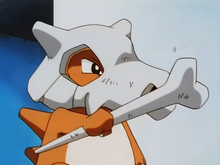

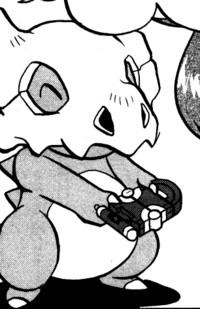
 For other sprites and images, please see Cubone images on the Bulbagarden Archives.
For other sprites and images, please see Cubone images on the Bulbagarden Archives.
